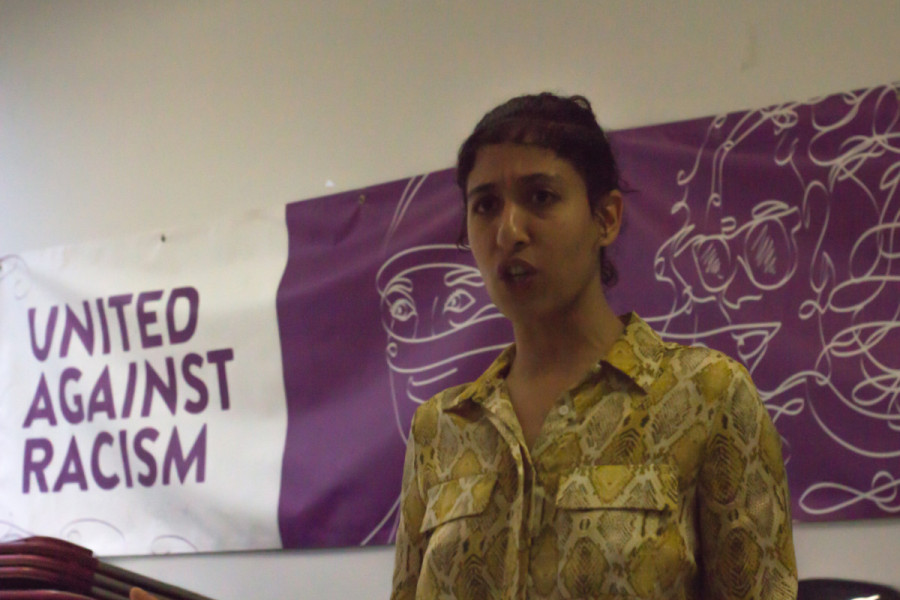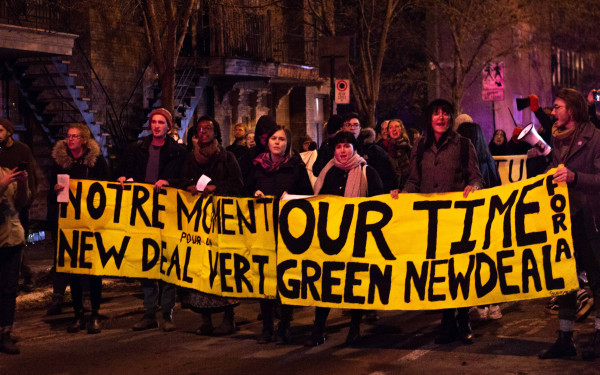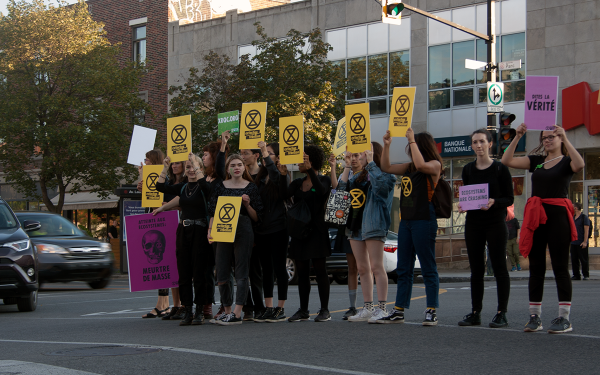Extinction Rebellion Quebec Continues Outreach Tour at Concordia
Climate Civil Disobedience Group Talks Climate Science and Getting Involved
Extinction Rebellion Quebec held an introductory presentation on the seventh floor of the Hall building on Oct. 24. The presentation, meant as an introduction to climate activism and to XR as a whole, was unfortunately poorly attended, with few people in the audience and only three, myself included, who were not already signed up.
The activist group has held numerous presentations like this one, in the hopes of introducing people to XR and to have them volunteer “as much as they want.” If you aren’t familiar with them, Extinction Rebellion, or XR, was founded in the United Kingdom in 2018, before making its way to Quebec and other countries. XR’s goal is to denounce government inaction against the climate crisis by performing acts of civil disobedience, like scaling the Jacques-Cartier Bridge earlier in October, forcing its closure.
Related readingUnfortunately, if you are familiar with them, the presentation did not give much in terms of new information, which may have caused the lower attendance for this particular meeting.
The first half of the presentation, given by volunteer Marguerite Kephart, was focused on a thorough introduction to the climate science.
This included the fact that the current average worldwide temperature had increased by 1.1 C since preindustrial times, which is less than half a degree away from the current goal set by the Intergovernmental Panel on Climate Change.
The current temperature increase has already begun to have dramatic consequences planetwide, including an increase in the number of climate refugees, water and resource scarcity, a large decline in the number of wild animals, and a dramatic increase in the number of heatwaves, including in Quebec.
Kephart also presented research that said Canada would be disproportionately affected by the global average increase in temperature. In the event of a 2 C increase, Canada as a whole would get 4 C warmer on average, Canadian winters would be between 6 and 8 C warmer on average, and the Arctic area would be between 8 and 10 C warmer on average.
We start with the science to shock you into awareness. — Nada Khashaba
Decolonizing activism
In the second half of the presentation, XR volunteer Nada Khashaba spoke about XR’s practice of civil disobedience.
“We start with the science to shock you into awareness,” said Khashaba.
Khashaba brought to attention how a science-only approach to climate activism was a very privileged one. “Science is very important, but we need to acknowledge the people who are already doing the work, and the people who are in the most danger,” said Khashaba, pointing out that those faced with the most climate danger are often Indigenous people and People of Colour. She also mentioned how climate activism was itself very white, including XR.

The group has been criticized in the last few weeks for their attitudes towards privilege while getting arrested, as minorities or people with visas are much more at risk when they get arrested when compared to a white person with permanent residency or citizenship.
Khashaba addressed the fact that XR, and civil disobedience as a whole, had a certain racial bias.
“We need to be really conscious of the fact that not everybody will have the same ability to take part in the same actions,” said Khashaba. She added that there were roles inside XR that did not involve committing civil disobedience actions, but were just as important, including legal support, aftercare for arrested activists, participating in outreach programs, and low-risk actions like Slow Swarms, which aim to spread Extinction Rebellion’s message with little disruption.
Related reading“Someone with privilege might want to put their bodies in the way of these systems, for example, if [the government] sees a lot of white people getting arrested, they’ll see that as a problem and be more compelled to act. Whereas with Black or Brown bodies, it’s easy to dismiss it as a cultural problem instead of a social problem.”
Nevertheless, Khashaba stressed that while getting arrested was not necessary, it was “a great thing to do, if you can.”
Concordia student Alashua Crowley said she became interested in XR when her friend, a part of the Gaelic chapter of XR, told her about their civil disobedience actions. While she didn’t know if she wanted to risk getting arrested, she was willing to get involved.
“Climate activism is very necessary, and I’m trying to get involved in it as much as I can,” said Crowley. “I’m from the Arctic, so you can see the effects of it first hand. Over there though, it’s much harder to get heard than here in Montreal.”

_900_593_90.jpg)


_600_375_90_s_c1.jpg)


